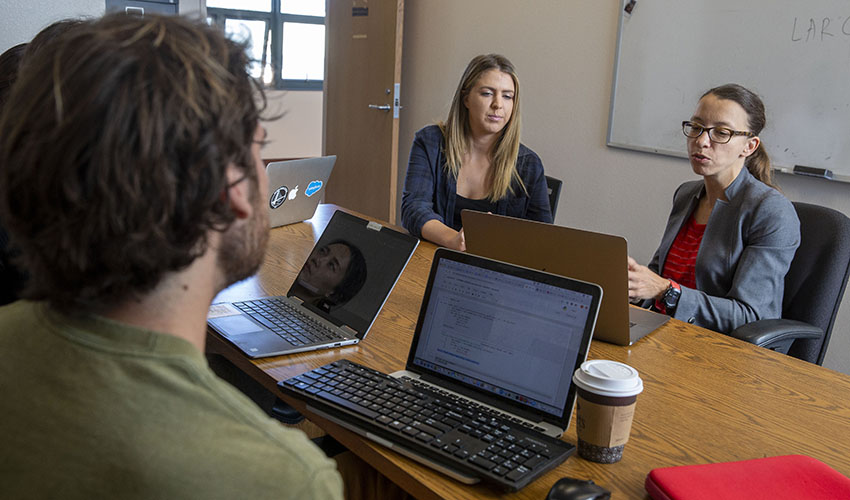New cutting-edge certification comes from an unexpected department

SF State Assistant Professor of English Language and Literature Anastasia Smirnova teaches students in her research lab.
Department of English Language and Literature launches computational linguistics certificate
Who would expect students in an English class to learn the basics of Python, a computer programming language? But at San Francisco State University that’s exactly what’s happening. This fall the Department of English Language and Literature launched a new certificate program in computational linguistics that gives students in-demand professional skills tailored to the Bay Area job market.
San Francisco State Assistant Professor of English Language and Literature Jenny Lederer helped design the new program in part because she wanted students to have clearly defined career options after graduation. “It’s a moral imperative for us to consider how we can help our students translate their academic experiences into jobs that can support them,” she said.
Students in the certificate program will get a foundation in linguistics while learning the basics of Python and computational linguistics methodology. Computational linguistics is primarily the study of how machines understand and process natural human language. When students complete the program they’ll be able to use computers to analyze large quantities of text — a skill that could translate into positions in health care, law, public relations and tech, Lederer says.
One of Lederer’s students is working on a project that has real-world potential: He’s studying the different ways patients and doctors talk about autoimmune disorders. By pulling language from patient blogs and medical literature he’s able to see, through language patterns, if patients understand their disease in the same way as the medical community.
“A project like this is valuable for health care communications, where the goal is for medical professionals to empathize with their patients’ experiences and for doctors to describe conditions using language that promotes health, treatment and optimism,” Lederer said.
Public relations is another field where students can apply what they learn. “Say I’m working for a PR firm and a client wants to figure out what people are saying about a new product,” she said. “I could either hold a focus group or I could ‘webscrape’ data from Amazon product reviews using a programming algorithm and pull out the positive and negative sentiments about the product.”
In Assistant Professor of English Language and Literature Anastasia Smirnova’s computational linguistics courses — which are required for the certificate — students learn how to perform a sentiment analysis. Smirnova’s also teaching students how to apply these tools to academic research. One group in her computational linguistics class is looking at movie scripts to study gender imbalances in film. The students used an online movie database to compare scripts from romantic comedies and action films. They hypothesized that women in the romantic comedies would have more prominent roles and longer monologues than men. What they found was surprising, she says. “Irrespective of genre, men had longer utterances on average,” she added.
Another career pathway for graduates is working on the development of virtual assistants like Apple’s Siri and Amazon’s Alexa. Two former graduate students of Lederer and Smirnova are working on Google’s version, Google Assistant. They’re teaching the virtual assistant nuances of language so that it properly responds to user questions. To do this kind of work, Lederer says, students need to learn multiple programming languages, have an advanced understanding of linguistics and know statistics. The certificate is a good first step, she points out.
“Wherever students go after the certificate, they’ll need to learn the specific type of programming the companies do and the methodologies specific to the project they’ll be working on,” she added. “This is a good way for students to get their feet wet and learn the basics. Then they can decide if they want to learn more.”